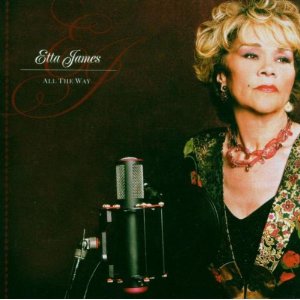Parting Shots: Etta James (Relix Revisited)

Following the tragic news of Etta James’ passing, we revisit this 2006 interview with the iconic R&B singer. This feature originally ran in the September/October 2006 issue of Relix Magazine.
Etta James has always been a fighter. From her upbringing in South Central Los Angeles, to her various bouts of drug addiction to her successful reemergence as a vital champion of the blues and R&B, James has always managed to retain her audacious attitude and charisma – not to mention her sonorous pipes. What she hasn’t retained is her full figure – recent operation has left her quite svelte and 200 pounds lighter. Just past the heels of her 68th birthday, James released All the Way, a new collection of songs by some of her favorite artists including Marvin Gaye, Prince, James Brown, Bobby Womack and her old pal, Johnny “Guitar” Watson.
Your sound touches on a variety of genres and some have suggested you were the first cross-over star.
We had so many great singers and it’s just hanging on to that. That’s what I do, to tell you the truth. I just hang on to what I remember. I go all the way back to church. That may sound funny but when I say the church it’s not to the church it’s to the feeling of how you spiritually click in. I liked gospel music but you see, soon as I got old enough, I jumped right on rhythm and blues. Rhythm and blues came on and it sounded like gospel music and people clapped their hands like that and tapped their feet. And me, I just go with whatever it is that I got to go with when I get ready to make a new record or something.
You started recording when you were quite young, getting your first big break at 14. Were there other women your age doing this at the time?
There a girl from San Francisco named Sugar Pie DeSanto. We would do a duet and stuff. Back then, Johnny Otis was the guy that always discovered the new artists. During that time the only people that was happening was Little Ester. And Little Ester was about 13 and she was with Johnny. Johnny Otis was in charge of everything on the West Coast. All the group singers, The Coasters, The Flares, everybody… Johnny was the Godfather.
On your new album, you cover a Johnny “Guitar” Watson tune, “Strung Out.” Though it’s about being strung out on love, it’s powerful given your battles with addiction.
Well, strung out can mean a lot of things. Strung out on whatever, strung out on life, strung out on your old lady or strung out on whatever.
You and Johnny were quite close back in the day, weren’t you?
I loved Johnny Watson. We grew up together and we traveled on the road together. Matter of fact, I had a secret crush on him. And that’s why they used to call him the male Etta James and I was the female Johnny “Guitar” Watson. When we started going to gigs here in L.A., we used to go to a place called the 5-4 Ballroom and they had a red carpet that would go up the stairs and stuff. And I remember them having that red carpet pulled for Johnny and me. We came to the gig, that was so hip, you know?
In 1967 you traveled down to Muscle Shoals to record what would become Tell Mama with regular sessions guys like David Hood and Spooner Oldham. There seemed to be a lot of pressure for you to really deliver something, which of course you did. What were those sessions like?
At the time, Muscle Shoals was the recording studio and the place where everybody went because it seemed like they were guaranteed. By what, I don’t know. During those days, Leonard Chess would go down there with you because he wanted you to record in Alabama. He had Rick Hall as the engineer for Fame recording studios and Leonard would come down there. I remember standing out there and watching his little plane pull up. If I went to record somewhere, he would be there. And his son Marshall would be there. We always went like that – like a family kind of situation because Leonard always treated me like I was his daughter.
Etta James was interviewed by Josh Baron.



















